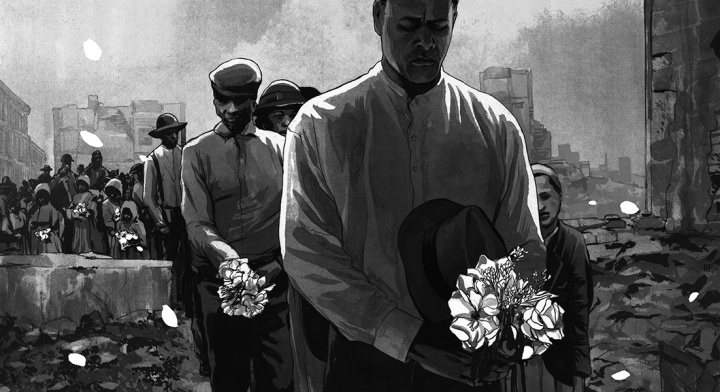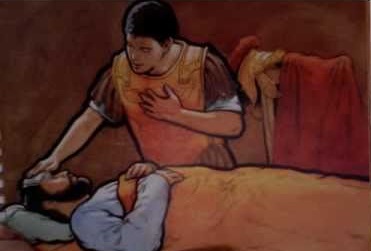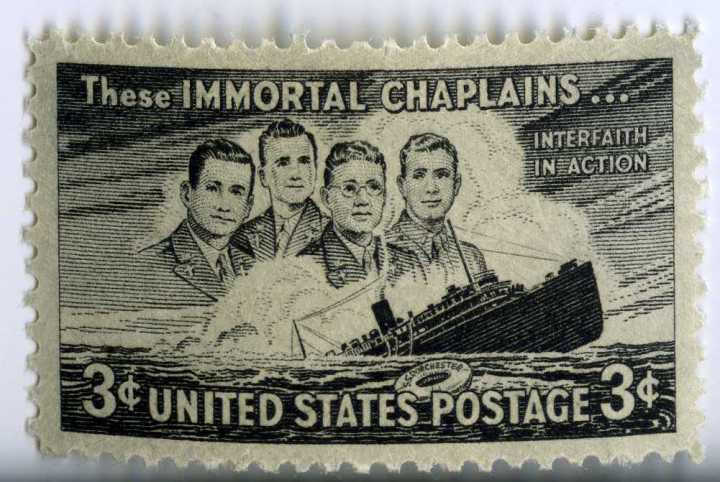A sermon for the Second Sunday of Pentecost, Year C
Galatians 1:1-12; Luke 7:1-10
(a sermon preached at St. John the Baptist Episcopal Church, Salem, NJ)
May 1, 1865. The Civil War was over. President Lincoln had been assassinated. Our nation was bruised, bloody, and broken. Ahead of Americans now was the long road of recovery. Cities had been destroyed. Lives had been shattered. Many Americans hated each other.
In Charleston, SC, an event happened on that May Day that went largely unnoticed. A parade was held. Men, women and children processed to a brand new cemetery and laid flowers at the new graves that were dug there. The graves were new, but many of the men in them had died years before. These people from the North had gone south to reclaim the bodies of their fallen men: sons and husbands, fathers and brothers. They reburied the bodies and laid them to rest in a proper cemetery. They knew that if they didn’t make it happen themselves, it may never have happened. You see, these were black women, some former slaves, who journeyed to the capital of the confederacy to rebury their dead.
The people of the South, those who had been on the “other side”, were also burying and reburying their dead, tidying up their graves, laying fresh flowers. These are the first accounts of what was originally called “Decoration Day” – a day to honor those who had paid the ultimate sacrifice. These men, and, yes, even a few women then, had died in the War, and on that day, the country stopped to remember them and to pay them honor. Within a few years, it was declared a national holiday, one that was hoped might restore some unity to the still deeply divided nation. What did these former enemies have in common? They had to bury their dead and mourn for them.
No doubt you have some war dead among the historic graves here at St. John’s, those who gave all. It falls to us to honor them and to teach generations that come after how important it is never to forget their sacrifice.
In this morning’s Gospel, Jesus is having an encounter with a soldier, but one who is very much alive. This soldier, this centurion, no doubt a courageous man, was afraid. Our translation says he had a slave who was “very valuable” to him, but the original Greek is not that easy to translate. The words speak of someone who served this centurion and was very dear to him. This servant was like family.

Israel at this time was under Roman occupation. Roman soldiers were typically hated by the average citizens, but this centurion was different. He treated to local population with respect. He even helped them build their synagogue. And they respected him in return.
The people of the town fetch Jesus and are bringing him to heal this centurion’s servant. Then in the middle of their journey to the house, the centurion sends this amazing request. He knew that Jesus could not enter his home. He was a gentile, and Jesus, as a rabbi, traditionally would not come inside. It was unclean. The centurion instead recognized that Jesus had authority, just like he did. If this centurion wanted something done, he didn’t have to do it himself, he could just give a command, and it happened. He knew Jesus had authority like that as well.
Jesus is astonished by this man’s belief, not just because the man showed faith, but his faith was even greater than those in Israel had. This gentile man, considered unclean, displayed such great faith that it astounded Jesus.
By the time Paul is writing his letter to the Galatians, some years after Jesus’ death and resurrection, there were those who clearly had forgotten the story of the centurion. Perhaps they hadn’t even heard it. There were those in the early church who wanted to keep the Gentiles out. Or if they were let in, they would have to convert to Judaism first. This is the fight that is the context to the lesson from Galatians this morning. This “other gospel” was one of division and exclusion. Some Christians believed it was “us vs. them”. Those unclean Gentiles were simply not welcome. Paul, on the other hand, believed that the good news that Jesus taught was for ALL people, not just a select few. It was this very centurion that could serve an example of the new kind of Christian. He followed Jesus, even if the religious authorities said he wasn’t allowed to. This centurion believed, even if others said he didn’t belong.
The Early Church needed the kind of courage the centurion had showed to stand up against these divisive groups in their midst. They defied the exclusionists. They took Jesus at his word, even if it cost them prestige in the local community. They followed Jesus even if it got them kicked out of the local synagogues, and it did!
God grant us the same faith as the centurion and the faithful Christians in Galatia – to stand with Jesus, welcoming everyone, no matter what the cost may be.
As we pause tomorrow to remember those who gave their last full measure of devotion for their country, one story comes to my mind and the minds of many priests, rabbis, and chaplains – the story of the Dorchester Chaplains.
On February 3, 1943, the SS Dorchester was torpedoed in the North Atlantic. The ship, with nearly 1,000 aboard, both civilian and military, foundered very quickly. But survivors told an amazing story of heroism. There were four military chaplains aboard: one Methodist, one Reformed Church, one Roman Catholic, and one rabbi. As the ship was sinking, they were witnessed helping others into lifeboats, not getting in themselves. They gave away their life vests. They prayed and gave comfort to those who were left on board. These men showed the rest of us what it means to serve God – they gave of themselves to the very end, and they did it together. Any differences in their religious traditions didn’t matter when the time came to sacrifice themselves. They gave their all, together. They served God, together. They died, together.
As a child, I collected stamps. I recall vividly coming across the stamp that commemorated their sacrifice. Something I know I saw written on the stamp then was something that really didn’t mean much to me then. The words “Interfaith in Action”. Whoever designed the stamp recognized how remarkable their sacrifice was. In a time of war, they were men of peace. May their sacrifice and their unity teach us once more of what God’s kingdom is really like – not one of division, “us vs. them”. God’s kingdom, instead, is filled with those who lived their lives for love and unity.
When the time comes to serve, may we learn from their example and set our divisions aside for the sake of the Gospel. It is left to us, the living, to honor their sacrifice not just with flowers and words, but with action. May we find the courage to stand strong, together, and help bring about God’s kingdom of justice and peace, together. Amen



Dear Scott,
This is a masterful weaving of faith and honor in times of war and occupation, and you didn’t say it, but it gives me hope that today’s progressives and conservatives can find some common ground in mourning and honoring the sacrifice our veterans have made, and work together to avoid more sacrifices. Thank you.